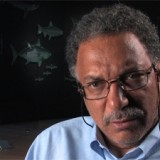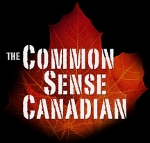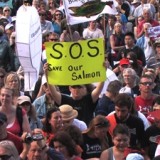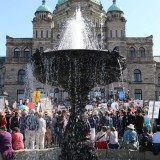Saturday May 8, 2010 was a fantastic day for all of us who want fish farms out of our waters. It all came together at Centennial Square in Victoria, culminating in a march on the Legislature. This was more than just a protest, although that it certainly was that.
The obvious event was the end of Alexandra Morton’s march from her home in Sointula – the settlement on Malcolm Island, just off the north end of Vancouver Island – to Victoria. It was a dramatic way to get public support for her fight to get fish farms out of our oceans and it was a gamble – what if it flopped?
As we will see, that certainly did not happen!
It was a time when many people and organizations which had been in this fight for some time could meet one another and bond.
It was a glorious time for many of us to see First Nations people so solid in their fight against fish farms and so eloquent in their presentations.
It was a time to get good publicity for a cause that is so dear to the hearts of so many – that was accomplished, but in a way no one would have foretold. More on that in a moment.
It was a time to pay tribute to a great Canadian, Alexandra Morton, and it indeed was her day. Only she could have made this day possible.
My neighbour, Gus Curtis, a brilliant nature photographer and I arrived at Centennial Park at noon, two hours before the Alexandra Morton march was to be there and already there were people arriving. By the time the marchers arrived, the park was full to overflowing whereupon all of us marched to the Legislature lawns.
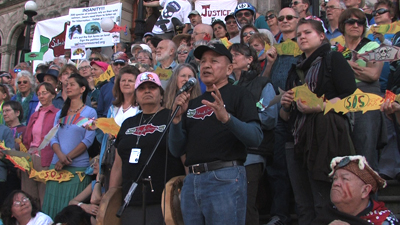
We heard many speakers but unquestionably the speaking part was highlighted by First Nations, led by Grand Chief Stewart Phillip, who made it clear that they would not cease the fight until it was won. It goes without saying that when Alex spoke our faces were smiles of pride mixed with tears of admiration.
I have been in this fight from the time the Campbell government, in the Fall of 2001, lifted the moratorium on fish farms. In the early days the worry was escapement of farmed fish into our waters and into the spawning grounds, a worry that hasn’t abated. But a call from Alex told me of the even bigger threat from the proliferation of sea lice and the horrible impact they had on migrating Pink and Chum salmon smolts.
I was doing a show on CKNW at the time. When I interviewed Alex I was struck by her quiet, subdued perhaps, yet forceful presentation.
Wendy and I made arrangements to meet Alex at Echo Bay in the Broughton Archipelago.
We stayed overnight in Port McNeill. That evening I received a call from Jennifer Lash of the Living Oceans Society who warned me that the mayor of Port McNeill had vowed to keep us from going on the boat to go to Alex’s house and that it might get ugly.
Mayor Gerry Furney was known to me as a flatulent demagogue, as long on hot air as he was short of grey matter, so I knew something mindless was in the wind.
At 7:00 AM Wendy and I were greeted at the pier by a large crowd with Furney hurling abuse at me through a loud hailer. It was scary but I walked up to a man directly in our path to the dock and asked “are you really going to physically prevent my wife and me from going down on the dock”. He hesitated but a second, then moved and said “of course not”.
Furney obviously didn’t comprehend the possible consequences of making a public enemy of someone before a crowd.
We met Alex and she took us on a tour of the fish farms and showed how they were sited so as to be directly in the path of migrating wild salmon. Her calm demeanor, knowledge and toughness under a serene presence were almost spellbinding. Here was a woman who knew what she had to do and was going to do it.
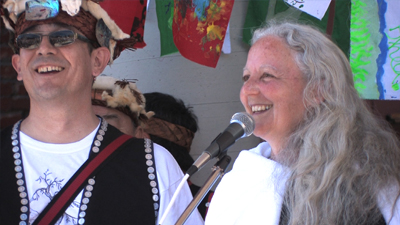
May 8th was Alex’s day.
How did we get publicity without actually getting publicity?
The coverage by the Victoria Times Colonist, the Vancouver Sun and The Province – all Canwest papers – was so appalling that it became a story itself that highlighted for the crowd there and eventually the public generally just how biased Canwest is and how snug in bed they are with the Campbell government.
The Province devoted two short paragraphs on A28 saying that the crowd was nearly 1000. The Times Colonist and the Sun did a contrast in views on the sea lice issue and ignored the speeches including a great one from Grand Chief Stewart Phillip. They also said the crowd was nearly 1000.
Ironically, the lie was put to these absurd crowd estimates by their corporate sister, Global News which had the figure at 4000-plus. They couldn’t have lied because they had the crowd on film. (You can judge for yourself by looking at the picture below).
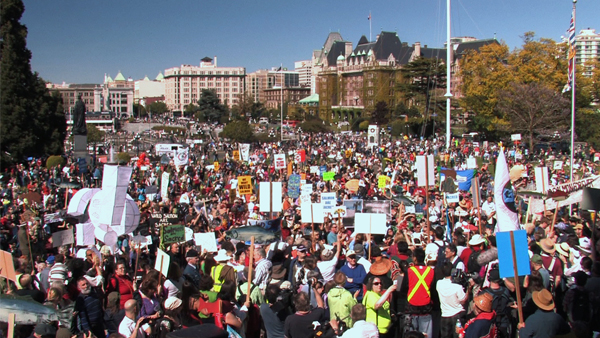
This yellow journalism of the Canwest papers was not only contradicted by its sister TV station; the Internet was flooded by angry witnesses laying out the truth. I daresay Alex got more coverage by far from angry witnesses than she could have got even with honest reporting.
May 8th in Victoria was more than an event – it was a happening. People from far and wide, native and non-native, young and old came together to protest to the government by paying their respects to and showing their love for Alexandra Morton, the Californian who came to BC to watch whales and ended as the saviour of her adopted province’s wild salmon.
It was a day none of us will ever forget.

